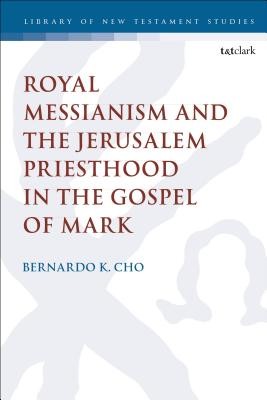
- We will send in 10–14 business days.
- Author: Bernardo Cho
- Publisher: Bloomsbury Publishing PLC
- ISBN-10: 0567685756
- ISBN-13: 9780567685759
- Format: 16 x 23.4 x 2.3 cm, kieti viršeliai
- Language: English
- SAVE -10% with code: EXTRA
Royal Messianism and the Jerusalem Priesthood in the Gospel of Mark (e-book) (used book) | bookbook.eu
Reviews
Description
Bernardo K. Cho investigates how Jewish messianism from the mid-second century BCE to the late first-century CE envisaged the proper relation between the Israelite king and the Jerusalem priests in the ideal future, and then proceeds to describe how the Gospel of Mark addresses this issue in depicting Jesus.
Cho responds to claims that the Markan Jesus regards the kingdom of God as fundamentally opposed to the ancient Levitical system, and argues that, just as with most of its related Jewish literature, the earliest Gospel assumes the expectation that the royal messiah would bring the Jerusalem institution to its eschatological climax. But Mark also depicts Jesus's stance towards the priests in terms of a call to allegiance and warning of judgement. Cho concludes that the Markan Jesus anticipates the destruction of the Jerusalem temple because the priests have rejected Israel's end-time ruler and thus placed themselves outside the messianic kingdom.
EXTRA 10 % discount with code: EXTRA
The promotion ends in 22d.09:36:53
The discount code is valid when purchasing from 10 €. Discounts do not stack.
- Author: Bernardo Cho
- Publisher: Bloomsbury Publishing PLC
- ISBN-10: 0567685756
- ISBN-13: 9780567685759
- Format: 16 x 23.4 x 2.3 cm, kieti viršeliai
- Language: English English
Bernardo K. Cho investigates how Jewish messianism from the mid-second century BCE to the late first-century CE envisaged the proper relation between the Israelite king and the Jerusalem priests in the ideal future, and then proceeds to describe how the Gospel of Mark addresses this issue in depicting Jesus.
Cho responds to claims that the Markan Jesus regards the kingdom of God as fundamentally opposed to the ancient Levitical system, and argues that, just as with most of its related Jewish literature, the earliest Gospel assumes the expectation that the royal messiah would bring the Jerusalem institution to its eschatological climax. But Mark also depicts Jesus's stance towards the priests in terms of a call to allegiance and warning of judgement. Cho concludes that the Markan Jesus anticipates the destruction of the Jerusalem temple because the priests have rejected Israel's end-time ruler and thus placed themselves outside the messianic kingdom.


Reviews